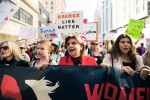The third annual Los Angeles Women’s March featured Cheeto-themed chants and posters, pink “pussy” hats and conversations about intersectional feminism.
Thousands of protestors, including dozens of UCLA students, gathered in Downtown Los Angeles on Saturday to show their support for women’s rights, but also immigrants’ rights, racial equality and health care reform. Turnout was lower than at the previous two Women’s Marches, the two largest single-day protests in American history, according to the Atlantic.
Attendees cheered as a balloon of an infant Donald Trump floated away above the crowd. They held signs with slogans, including “the future is intersectional” and “eat a Tide pod, patriarchy.” The crowd chanted en route to City Hall “hey hey, ho ho, Cheeto man has got to go,” and “immigrants in, racists out.”
Sandhya Rajkumar, a second-year pre-computational and systems biology student, said she was excited to attend an event in which a diverse group of people would come together to support a variety of issues important to her.
“It was also cool to see people putting a huge emphasis on inclusivity,” Rajkumar said.
Aishwarya Natarajan, a third-year molecular, cell and developmental biology student, said this was her first time participating in the Women’s March.
“Overall it was very welcoming,” Natarajan said. “I saw all kinds of women from different sexualities, nationalities, backgrounds.”
Jeanette Salinas, a Los Angeles resident, said she attended the march because she has learned throughout her career that it is difficult for women to move up the professional ranks because mostly men hold positions of power.
“My mother and my father told me that I could do anything, so that was always in my roots,” Salinas said. “But in reality, it isn’t like that.”
Some students said they think while the Women’s March has generally positive goals, it has failed to be inclusive of groups including Jews and the LGBTQ community.
Tamika Mallory, co-president of the Women’s March group, has drawn controversy for refusing to condemn Nation of Islam leader Louis Farrakhan’s history of anti-Semitic remarks. Several groups, including the Democratic National Convention, withdrew their sponsorships of the event.
Justin Feldman, member of Students Supporting Israel and a fourth-year Middle Eastern studies and political science student, said he thinks anti-Semitism has been normalized within many progressive movements, including the Women’s March.
“People need to explore in general, in progressive movements, the exclusion of Jewish but also Zionist voices,” Feldman said.
Paulette Orhii, the co-director of the Bruin Consent Coalition, said she is concerned about what she sees as the exclusion of underrepresented minorities.
“I think that the tendency for most of the women to be white and talking about issues in a very almost shallow and performative way that excludes women of color makes me think (the Women’s) March isn’t for me,” Orhii said.
Natarajan said she thinks feminism needs to be more inclusive, but added she does not think the March’s shortcomings invalidate the entire movement.
“I think we can start moving towards that direction, but it doesn’t mean the Women’s March isn’t still valid,” Natarajan said.
Orhii said she thinks organizing is still important in nonelection years.
“Cross-coalition building is important,” Orhii said. “That’s where the momentum builds.”
Contributing reports by Lena Nguyen and Shelby Dunagan, Daily Bruin contributors.

“inclusivity of feminist movement?!” Let’s see… Christian women aren’t welcome; women who voted for Trump (i.e. the majority of white women) aren’t welcome; women who don’t believe in abortion aren’t welcome…
fat angry dykes who identify as cheetahs are very welcome though
nice “inclusivity”
Parroting the adults of the mainstream media, the children of the Daily Bruin cover the anti-Trump march masquerading as a “women’s march” (whatever that means), while completely ignoring the much better attended though less virtue signaling March for Life.